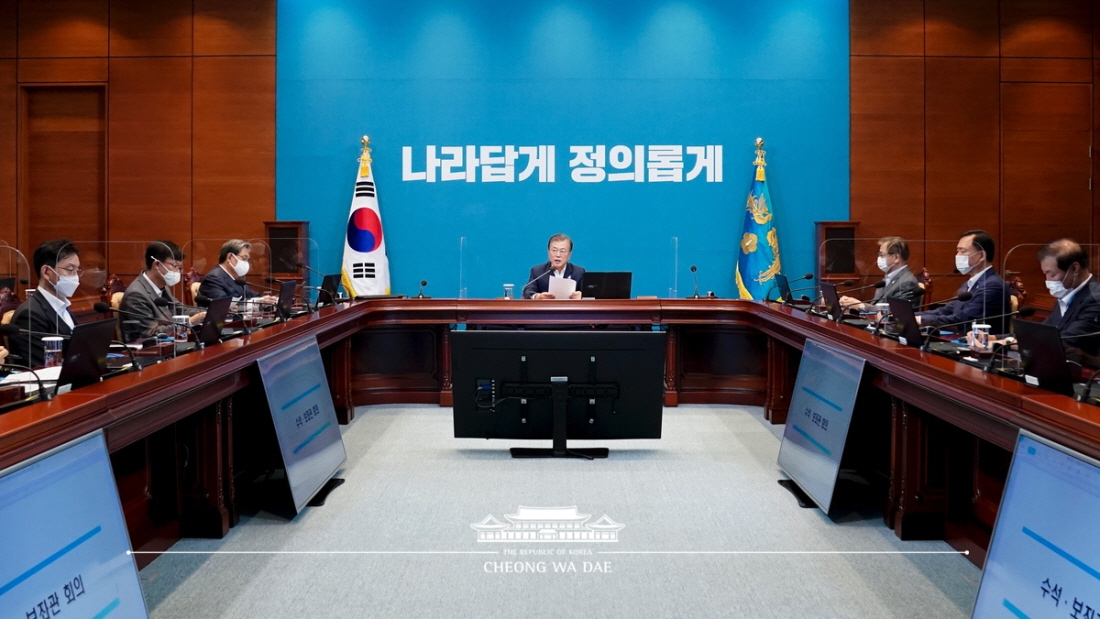이 웹사이트는 제19대 대통령 임기 종료에 따라 대통령기록관이 「대통령기록물 관리에 관한 법률」에 의해 이관받아 서비스하는 대통령기록물입니다. 자료의 열람만 가능하며 수정 · 추가 · 삭제는 불가능합니다.
다만, 「개인정보보호법」에 의하여 개인의 정보를 보호받기 원하시는 분은 관련 내용(요청자, 요청내용, 연락처, 글위치)을 대통령 웹기록물 담당자(044-211-2253)에게 요청해 주시면 신속히 검토하여 조치해 드리겠습니다. 감사합니다.
SPEECHES & REMARKS
BRIEFINGS
Opening Remarks by President Moon Jae-in at Meeting with His Senior Secretaries

Korea’s daily COVID-19 caseload, which had surged into the 400 range, has fallen to the 300s and 200s over the past four days. However, the disease control authorities have determined that it is still too early to consider this as a positive sign of stabilization.
A jump in the number of confirmed cases was prevented through the weekend thanks to the majority of people who refrained from going out and doing normal daily activities in compliance with enhanced social distancing rules. The vast majority of churches have also cooperated by conducting online worship services. I am grateful to the people for enduring many inconveniences and following epidemic prevention and control guidelines.
The flipside of such cooperation is the growing difficulties for many people, including those who run restaurants, cafes, after-school tutoring institutes, private study rooms and sports facilities. I feel truly sorry for this. The Government will do everything possible to help people return to their normal daily lives and economic activities as soon as possible.
The reason for stepping up social distancing rather than relaxing even as the number of confirmed cases has been falling like this is that there are unknown destabilizing factors still lurking in the number of confirmed cases. The main reason for these latent uncertainties is the fact that many who participated in the August 15 rally in Gwanghwamun and many members from some churches and their contacts have yet to take COVID-19 tests. Whether their refusal originates from misguided faith, fake news or opposition to the Government, it is causing too much damage to the people, negating all of their efforts and making it harder for ordinary people to earn a living. It is a truly lamentable situation.
Among the 17 COVID-19-related deaths from August 20 up to yesterday, five were posthumously confirmed to have been infected and four lost their lives within a day of their diagnosis. This is because the elderly comprise a high percentage of the confirmed cases and the relevant testing came late. Such belated testing could jeopardize the lives of those who may have the virus and their contacts as well. As anonymous COVID-19 testing is available to everyone, I ask all the people to cooperate with the epidemic prevention and control authorities’ request and get tested promptly. I also entreat anyone with even the slightest suspicion of having COVID-19 to get tested voluntarily so as not to miss the proper time for diagnosis and treatment.
It is regrettable indeed that the medical community has yet to cease its collective refusal to treat patients at this critical juncture. Now is when we need doctors more than ever before. The Government has made several concessions with the determination to prevent a vacuum within medical services amid the grave COVID-19 crisis. An agreement was made, and it looked as if the issue was going to be resolved. The Government has already made announcements about how the situation has developed and our firm position, so I will not repeat these.
Once the COVID-19 situation is brought under control, we will be able to discuss the issues together with the medical community through the consultative body that the Government has promised to create and through the consultative forum proposed by the National Assembly. The issues to be discussed include ones that all parties have agreed to – resolving regional imbalances in medical services, strengthening essential healthcare and expanding public health services – and the problems raised by the medical community. It is difficult to understand what more conditions should be met to get doctors back to work. Doctors should stay right beside the patients. They should not forget their Hippocratic Oath to put the life and health of the patient above all else.
Time is running out because of the urgent COVID-19 situation. The Government does not have many options left as it has to enforce the law to safeguard people’s lives and health. I urge and expect the medical community to make a decision in the interest of a greater cause; return to work as soon as possible, look after patients and end public anxiety.



